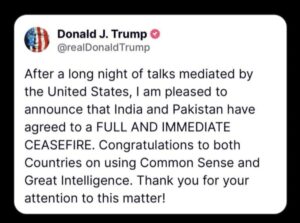China Reaffirms Support for Pakistan’s Sovereignty Amid Escalating South Asia Tensions: India Responds Sharply

Beijing, May 11, 2025 – Chinese Foreign Minister Wang Yi reiterated China’s unwavering support for Pakistan’s sovereignty, territorial integrity, and national independence during a phone call with Pakistan’s Deputy Prime Minister and Foreign Minister Ishaq Dar on Saturday. The conversation, reported by Pakistan’s Foreign Office, comes amid heightened tensions in South Asia following the deadly April 22 terror attack in Pahalgam, Jammu and Kashmir, which killed 26 civilians and triggered cross-border military exchanges between India and Pakistan.
Wang Yi, describing Pakistan as an “all-weather strategic cooperative partner” and “ironclad friend,” emphasized China’s commitment to standing firmly by Islamabad. Dar briefed Wang on the volatile regional situation, including a US-brokered ceasefire agreement between India and Pakistan, which was reportedly violated hours later with drone sightings along the Jammu and Kashmir border. Wang praised Pakistan’s “restraint” and “responsible approach,” signaling Beijing’s alignment with Islamabad’s stance.
The Pahalgam attack, claimed by The Resistance Front (a proxy for Pakistan-based Lashkar-e-Taiba), prompted India to launch “Operation Sindoor” on May 7, targeting alleged terrorist infrastructure in Pakistan and Pakistan-administered Kashmir. India’s National Security Advisor Ajit Doval, in a call with Wang Yi, defended the strikes as necessary counter-terrorism measures but stressed that “war is not India’s choice.” Wang condemned the attack, reiterated China’s opposition to terrorism, and urged both nations to exercise restraint and resolve differences through dialogue to avoid further escalation.
India’s Reaction
India responded sharply to China’s reaffirmation of support for Pakistan. The Ministry of External Affairs (MEA) issued a statement on Saturday, calling China’s remarks “unfortunate and biased” and accusing Beijing of “ignoring the clear evidence of Pakistan’s complicity in cross-border terrorism.” The MEA emphasized that India’s actions, including Operation Sindoor, were “targeted, precise, and aimed solely at dismantling terrorist networks,” rejecting any suggestion of violating Pakistan’s sovereignty. It further urged China to “refrain from shielding Pakistan’s well-documented support for terrorist groups like Lashkar-e-Taiba” and to support an impartial investigation into the Pahalgam attack, as India has consistently demanded.
Indian officials also expressed disappointment over China’s diplomatic maneuvers, particularly its role in diluting a UN Security Council statement on the Pahalgam attack, which omitted references to cross-border linkages and the TRF’s ties to Pakistan. Congress MP Shashi Tharoor noted that the recent UNSC meeting “did not go in Pakistan’s favor,” with several members raising concerns about terrorism and Lashkar-e-Taiba, suggesting that China’s support for Pakistan was not as unconditional as portrayed.
Posts on X including @IndiaToday, quoted retired Lt. Gen. KJS Dhillon stating that “except for China and Turkiye, no country will come forward to help a state like Pakistan,” highlighting India’s growing international support.
China’s stance reflects the deep China-Pakistan strategic partnership, exemplified by the China-Pakistan Economic Corridor (CPEC). However, India’s strong rebuttal and the global spotlight on Pakistan’s alleged terror links suggest that Beijing’s balancing act—calling for de-escalation while backing Islamabad—may face scrutiny. As tensions persist, the international community, including the US and Russia, continues to urge restraint.





